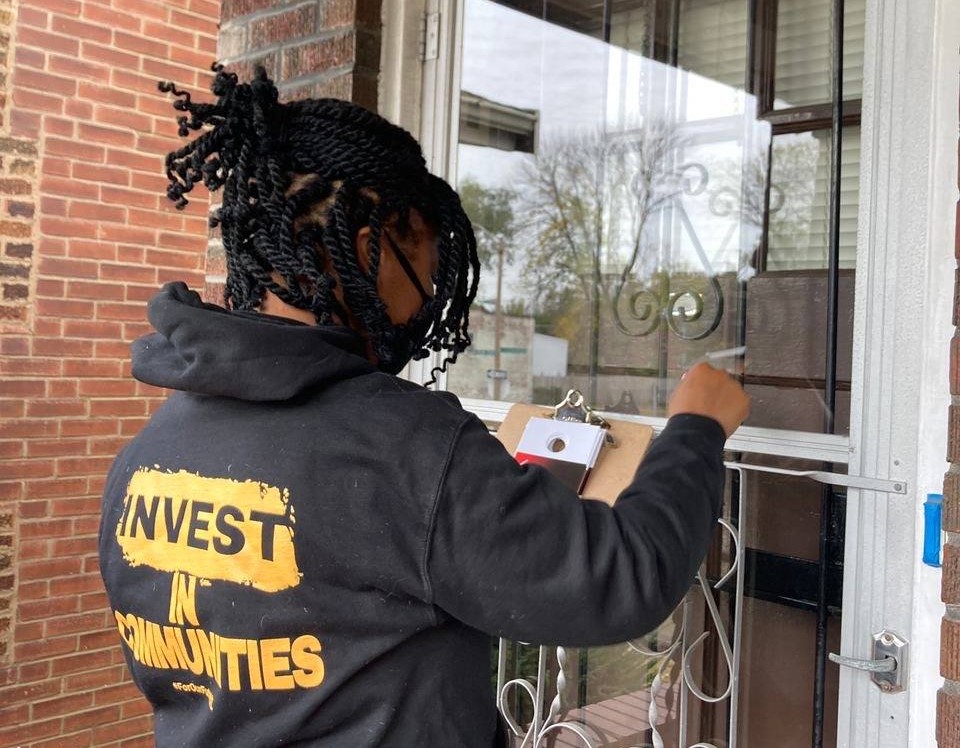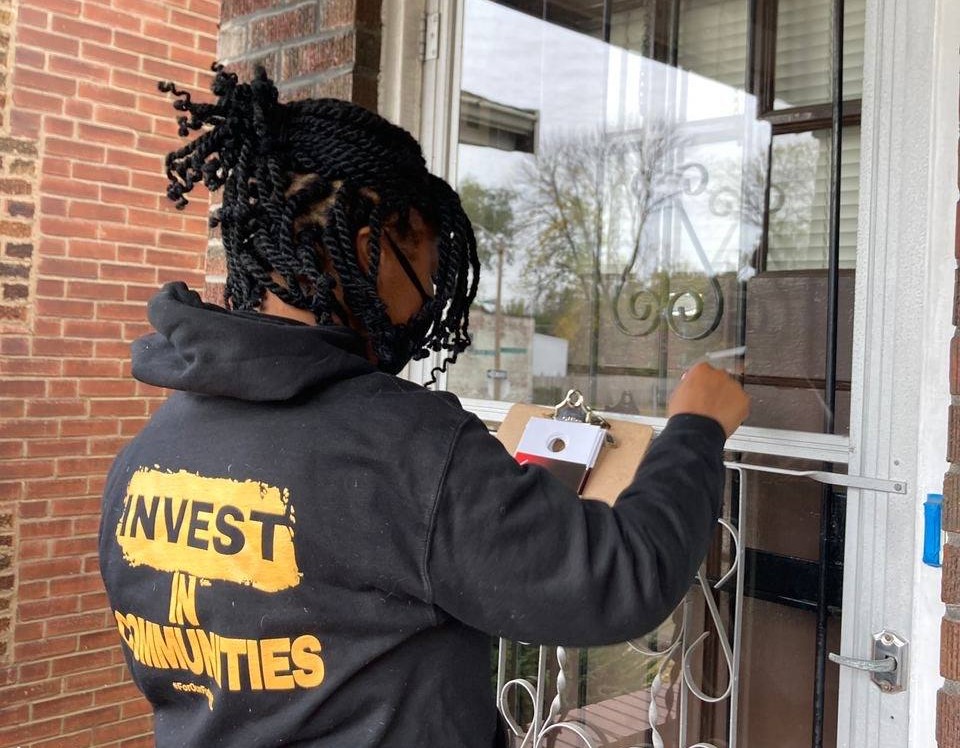Policing and Public Safety at Odds in St. Louis Mayoral Race
Instead of expanding the "arrest, prosecute, and incarcerate model," advocates want the next mayor to address the root causes of violence.
Meg O'Connor | February 26, 2021


This article originally appeared on The Appeal, which hosted The Political Report project.
Instead of expanding the “arrest, prosecute, and incarcerate model,” advocates want the next mayor to address the root causes of violence.
Two-hundred sixty-two people were murdered in St. Louis last year, bringing the city’s homicide rate higher than it’s been in 50 years. Only about 30 percent of those cases have been closed.
The spike has made public safety a central issue in an upcoming mayoral election. But in a city that’s been reckoning with racial justice since the police murder of Michael Brown in nearby Ferguson seven years ago, many are saying that ramping up policing isn’t the answer.
“We need to divest from harmful systems like the criminal justice system that has been used to cage, control, and surveil communities, largely Black communities … and put that money into resources that make communities safe,” said Jae Shepherd, an organizer with Action STL. “The new administration needs to really look at our city budget,” Shepherd added, noting that a significant portion goes to policing yet crime is still high. “Obviously arresting and incarcerating people isn’t working.”
Shepherd and others say the city’s decades-long trend of investing heavily in policing has not had the desired effect when it comes to reducing crime or improving clearance rates for violent crimes like murder. Instead, organizers say they would like to see the next administration take a second look at the police department’s budget and see where funds could be redirected to non-police crisis response teams and violence interrupters.
All four candidates running to become St. Louis’s next mayor say reducing violence and raising the city’s low homicide closure rate are top priorities, but have different plans for how they’ll do it.
City Treasurer Tishaura Jones and Alderperson Cara Spencer are promising a clear departure from the status quo. The two align on several issues like reducing the scope of policing in favor of alternatives and closing The Workhouse, one of the city’s notorious jails. But Tishaura Jones has gone a step further by championing an end to cash bail and the decriminalization of sex work.
Meanwhile, in a recent forum, utility executive Andrew Jones praised the police and opposed reducing the police department’s budget. Board of Alders President Lewis Reed is also wary of reforms that would shrink the criminal legal system; he opposes closing The Workhouse, for example. And both are open to expanding policing with aerial surveillance.
St. Louis’s current mayor, Lyda Krewson, isn’t seeking a second term, so voters will choose between these four candidates in a primary election on Tuesday. The two candidates with the most votes will go on to a runoff to decide the next mayor on April 6.
—
Local organizers who spoke with The Appeal: Political Report said they want the next administration to move away from the current public safety model and recognize that improving public safety does not equate with increasing police funding.
“We want less of an emphasis on the arrest, prosecute, and incarcerate model and more of an emphasis on getting to the root causes of violent crime in our neighborhoods,” said Johnson Lancaster from the Coalition Against Police Crimes and Repression (CAPCR), also noting that an outsize portion of St. Louis’s budget is spent on policing. “That money should be redirected to social programs that help address some of these needs that we’re talking about.”
A coalition of 38 grassroots organizations in St. Louis, including Action STL and CAPCR, signed on to a comprehensive policy agenda that offers a framework for how the city can move away from policies that have contributed to racial and socioeconomic inequity. The agenda, called The People’s Plan, also endorses policies that could help lift more people out of poverty, end over-policing and mass incarceration, and keep people in their homes. One of the plan’s four pillars is “re-envisioning public safety” by divesting from policing and investing in alternative forms of crisis response and in violence interruption programs. The plan also calls for civilianizing certain police functions, like traffic enforcement and internal affairs.
Cities across the country have begun to shrink the roles and responsibilities of police by shifting traffic enforcement, forensic analysis, and response to mental health calls to other departments. In Austin, Texas,, city leaders have changed the city’s 911 system so that callers are asked if they need fire, EMS, mental health services, or police. Nearly a quarter of all people shot and killed by police in the United States since 2015 suffered from mental illness.
In St. Louis, 911 dispatchers receive hundreds of thousands of calls each year, and thousands of those could be diverted to behavioral health responders, which could give police officers more time to work on solving violent crimes like homicide, and provide a more appropriate response to the person in crisis. Spencer, Tishaura Jones, and Reed have all said they support expanding St. Louis’s Cops and Clinicians program, which sends health professionals to respond to crisis calls alongside police officers. The program is still in its infancy with only a small staff. These three candidates have also expressed support for changing the city’s 911 system to direct some calls to health professionals instead of police.
Spencer and Tishaura Jones have said they support moving certain functions, like internal affairs and use-of-force investigations, out of the police department. Andrew Jones does not support such a proposal. Reed did not commit to doing so but said he may “look into” it if other efforts to improve the police department’s operations didn’t work.
The Political Report asked all of the candidates if they would consider reforms like one passed in Berkeley, California, which shifts traffic enforcement away from the police. Andrew Jones said he would like to see the results of Berkeley’s measure before committing to anything. Tishaura Jones said she would “absolutely” consider such a proposal and said that if she is elected, she would review the police department’s functions to see what “could be enforced by civilians” because the city needs “to transform and reimagine how we respond to citizens.” Spencer and Reed did not respond.
Both Tishaura Jones and Spencer have expressed support for rethinking the police department’s budget. Currently, the St. Louis Police Department has an operating budget of over $200 million. Jones said she thinks that figure is “too much” and said resources within the city’s Public Safety Department need to be reallocated. Similarly, Spencer said the city has “some gross inefficiencies in our police department” and that the budget “has to be reoriented.” Both indicated that funds should go to a broader range of safety measures, including non-police emergency responders.
Andrew Jones does not believe police funding needs to be cut, and Reed did not respond when asked about his stance on the issue. Jones and Reed have said they would be willing to consider expanding police presence in St. Louis by allowing an aerial surveillance measure to pass City Council. Tishaura Jones and Spencer oppose it.
For Spencer and Tishaura Jones, a broader view of public safety includes violence interruption programs like the focused deterrence model. Focused deterrence involves identifying people who have repeatedly committed certain crimes and bringing them into meetings with police, prosecutors, social workers, and other groups who tell the individual what the consequences will be for continuing to commit violence and offer incentives to stop. While Spencer has cited the success of the program in Oakland as a reason to pursue it in St. Louis, elsewhere in the United States, it has led to surveillance and abuse.
The violence prevention method endorsed by Reed, Cure Violence, has also had mixed results. Local activists are unhappy with the way the program ended up being implemented and criticized the lack of involvement from the community groups that brought the program to the city in the first place. Andrew Jones did not express support for any violence interruption program and said he wants police to have the resources and support they need to continue doing what he calls a “fantastic job,” despite the city’s recent rise in violent crime and unsolved homicides.
When it comes to moving away from what local organizers have called the “arrest and incarcerate” model of public safety, both Tishaura Jones and Spencer say they want to close The Workhouse, a notorious city jail that houses pretrial detainees in deplorable conditions. Andrew Jones does not support closing it, while Reed previously supported efforts to close the jail but now says it is irresponsible to do so during the COVID-19 pandemic.
Tishaura Jones said she would use funds saved from closing The Workhouse to invest in job training, housing, diversion programs, and substance use programs. And she is the only candidate in the race who wants to further reduce mass incarceration by decriminalizing sex work and ending cash bail for nonviolent offenses.
“I think a lot of the issues are interconnected—the violence, the schools, the housing, the jails, policing,” said Latrell Stanton, an organizer with Ex-Incarcerated People Organizing St. Louis. Stanton added that he wants the next mayor to present progressive solutions.
“It seems like when it comes to crime, the solution is always to give more money to the police department. That never stops the crime, it never deters the crime. If the crime does go down, I never feel like it’s the result of policing.”


